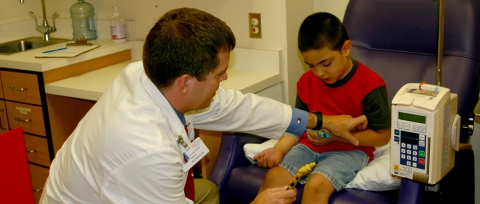Endocrinology

The pediatric endocrinology clinic at the University of Arizona Pediatrics Department and Banner University Medical Center-Tucson is the longest-running clinic of its kind in Southern Arizona. Our multi-disciplinary team is here to deliver personalized, compassionate care to the children and families in our community. In addition to our providers, we have certified diabetes educators, nurses, a dietitian, and a social worker who work collaboratively to provide a welcoming environment for our patients, from infancy to adolescence. As hormone specialists, our pediatric endocrinology providers treat a variety of conditions that can affect many areas of a child’s basic health. We work with families from diagnosis to long-term management.
We care for children and teens with a broad range of endocrine disorders, including:
Adrenal Disorders
The adrenal gland makes hormones associated with salt balance, stress response, and the building blocks for sex hormones. Disorders of the adrenal gland can cause the body to make too much or too little of the hormones. Addison disease is a form of adrenal insufficiency that occurs when not enough cortisol and aldosterone are made. Congenital adrenal hyperplasia (CAH) is a genetic condition that is usually found on a newborn screening test. It is a genetic condition that blocks the adrenal glands from making enough cortisol hormone and, sometimes, aldosterone. Adrenal tumors are described as either functioning or non-functioning. If an adrenal tumor is a functioning tumor, then too much of the adrenal hormones are being made. This can cause problems such as early puberty, poor height growth, excess weight gain, high blood pressure, increased heart rate, sweating, and headaches.
Diabetes Insipidus
Diabetes Mellitus
- Type 1 diabetes mellitus (T1DM) is an autoimmune disorder where the body is unable to produce the insulin it needs to function. This causes high blood sugars in the body which can appear as symptoms such as weight loss, increased appetite, increased thirst, and increased urination.
- Type 2 diabetes mellitus (T2DM), like Type 1 diabetes mellitus, also results from the body not having enough insulin for what it needs. Unlike people with T1DM, people with Type 2 diabetes are able to produce insulin. Certain children may be at higher risk of developing type 2 diabetes, including those with a family history and who are overweight or obese.
- Cystic fibrosis-related diabetes mellitus (CFRD) is a condition that sometimes develops in patients with cystic fibrosis (CF). The thick, sticky mucus seen with CF causes scarring of the pancreas. This situation can make it difficult for the body to make enough insulin or to respond to blood sugar. Some patients with CFRD require insulin, much like patients with Type 1 diabetes mellitus. Patients with CFRD may also be insulin resistant, like patients with Type 2 diabetes mellitus.
Differences in Sex Development
Differences in sex development (DSD) are congenital conditions that affect how genitalia appear and/or how children progress through puberty.
Gender Dysphoria
Gender dysphoria is a condition where a child’s gender identity differs from their sex assigned at birth. One’s gender identity may not fit easily into the traditional definitions of male and female.
Growth Problems
Short stature or above average height can be caused by a growth disorder. Growth hormone deficiency is when the pituitary, the body’s master hormone gland, does not make enough growth hormone. This condition results in poor height growth and short stature.
Hypoglycemia
Hypoglycemia means low blood sugar. It can be a normal body response to being without sugar for a long time, a complication of diabetes mellitus treatment, or a signal to a more serious condition.
Pituitary Disorders
The pituitary is the body’s master hormone gland. It is involved in growth, metabolism, stress response, puberty, and water balance. Pituitary conditions result from too much or too little hormones being made.
Puberty
Signs of puberty in girls typically occur between 8-13 years old and in boys between 9 and 14 years old. If this process occurs too early (before 8 years old in girls and 9 years old in boys), this is considered early puberty, also known as precocious puberty. If this process occurs too late, this is considered delayed puberty. For girls, that means they have not experienced breast development by 13 years old. For boys, that means their testicles have not increased in size by 14 years old.
Thyroid Disorders
Hyperthyroidism is the medical term for an overactive thyroid, when the thyroid gland is making too much thyroid hormones. The most common cause of hyperthyroidism in children is an autoimmune condition, known as Grave Disease. Hypothyroidism is the medical term for an underactive thyroid, when the thyroid gland is not making enough thyroid hormones. It can be present at birth becasue a child is born without a thyroid or an underdeveloped one. This is called congenital hypothyroidism. If a child develops hypothyroidism after birth, it is called acquired hypothyroidism and is most often caused by an autoimmune reaction.
Our providers are currently offering virtual and in-person visits.
To make an appointment, please contact us at 520-694-5437 (KIDS)
Our clinic locations are:
Northwest Clinic: 6261 N. La Cholla Blvd. #131 Tucson, AZ 85741
Wilmot Clinic: 535 N. Wilmot Rd., Suite 101 Tucson, AZ 85711





